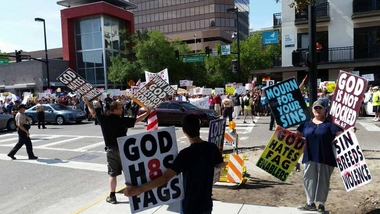The “H” word

by Tom Spector
Op-Ed
The word “hate” has come to fill an all-purpose category in the LGBTQ world for anyone who does anything for any reason against us. “Hate” inflation is certainly evidenced online in the aftermath of Orlando. As the first of many funerals began in Orlando, the hate group Westboro Baptist Church threatened to protest the victims’ funerals as their grieving families gathered to mourn their loved ones.
As promised, at least six members of the Kansas-based group showed up in Orlando. But their hate was met with thousands of Orlando residents who formed a human wall of love to shield the families of the victims from their hate, according to the Gaily Grind.
The Grind managed to stuff the word “hate” four times into two sentences with a predictable watering-down effect. I think this is revealing of the word’s widespread overuse throughout the LGBTQ community – from informal conversations to political calls-to-action.
Am I alone in finding “hate” to be an unsatisfactory descriptor for the variety of motives behind every action from Proposition 8 to Matthew Shepard’s murder to a madman’s shooting spree in Orlando? Isn’t it time we filled out our vocabulary with more psychologically probing and sociologically exacting concepts?
Most likely, the profligate use of the word stems from the desire to see its enactment as a form of special protection for LGBTQ victimization embodied in the phrase “hate crime”. But let’s evaluate what has become an automatic go-to sentiment when an LGBTQ person is intimidated, beaten, or murdered.
We should ask: What about a beating of a gay man with a baseball bat by a stranger outside a club is worse than the same man going home and beating his wife with the same bat? To the victims in each case, the answer should be: nothing, it’s equally blameworthy in both cases. But we think of the first beating as a hate crime and the second as domestic violence. Does this distinction help us get to the heart of anything?
The FBI defines a hate crime as, “a traditional offense like murder, arson, or vandalism with an added element of bias. For the purposes of collecting statistics, the FBI has defined a hate crime as a ‘criminal offense against a person or property motivated in whole or in part by an offender’s bias against a race, religion, disability, sexual orientation, ethnicity, gender, or gender identity.’
“Hate itself is not a crime - and the FBI is mindful of protecting freedom of speech and other civil liberties.” In sum, a hate crime = violence + bias.
Bias is so difficult to prove that many prosecutors stay away from it. But, since we are trying to work through this, let’s consider that gay-bashing might indeed be worse than wife-bashing in one respect. The Huffington Post got to the heart of the matter: “Bias attacks terrorize entire communities, not just individuals.”
Thus the intended impact of a hate crime is much wider, and if prosecution of that act as a hate crime has a deterrent effect then its invocation would be socially useful.
I certainly found the events in Orlando to be intimidating. Only a careless person wouldn’t. How many of us hesitated, as a result, to attend a Pride event this year? The shooter’s intent was to terrorize an entire community, and to the degree we were all sent back underground, he succeeded. Such a crime is worthy of singling out.
But here’s the problem: the word “hate” in the LGBTQ world has assumed the mantle of simultaneously assigning motivation, social classification, and victimization status, and it’s not doing any of that particularly well anymore, if it ever did. Invoking the shorthand all-purpose word “hate” for these differing events has become a way to quickly compartmentalize them without any real intention of confronting and combating their underlying motives.
We can do better. For instance, ascribing the motives behind the Westboro Church people and the Orlando shooter simplistically to “hate” glides over the fact that uncritically received bigoted religious dogma is a regular source of violence.
It reduces support for Proposition 8 from an instance of widespread ignorance supplemented by a vague sense of social insecurity whipped-up by religious interests to the same thing as well.
We stand a better chance of exposing the diverse root causes of this violence if we take the time to investigate and describe the underlying attitudes behind the “hate.” That’s why, for me at least, the word “hate” and the phrase “hate crime” have outlived their usefulness.
The Gayly – September 12, 2016 @ 12:30 p.m.





